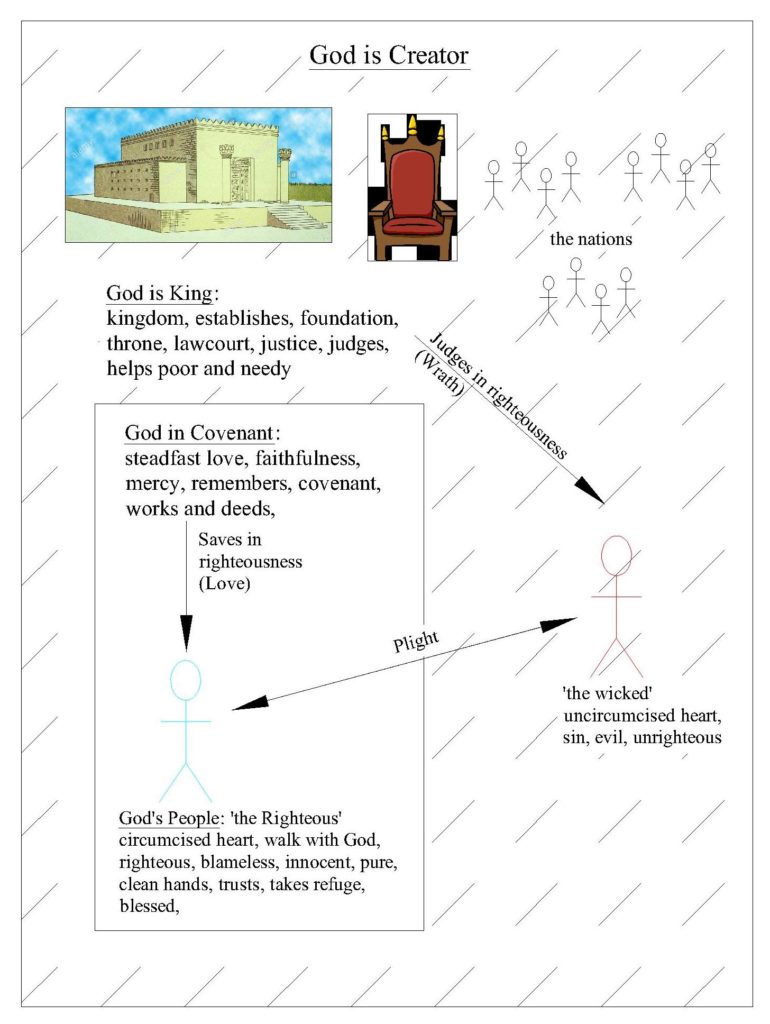
In this post we look at the law court theme associated with righteousness and justification. Most of this has already been covered in the Kingdom of God. Here we cover some more specific passages to do with the divine law court.
This is the sixth of a series of posts on the concept of righteousness and justification in the scriptures. I’ve listed most (if not all) references to right, righteous, righteousness and just, justified and justification in the scriptures to do my own study on what the scriptures say about the concept.
Click on this link to go to the first post which has a summary and links to all.
Kingdom of God
Those who are in authority are the ones who judge in a law court setting. Typically one of the primary roles for a king is to bring judgment over different matters.
God as King Judges the world (Ps 7.8-11,17; 9.4-8; 96.10,13; 98.6-9; Acts 10.42; 17.31; Rom 2.5; 2 Thes 1.5; 2 Pet 2.4-9)
There is significant overlap with the law court theme with God’s kingly justice. With respect to God, his judgment come under his role as king.
4 For you have maintained my just cause; you have sat on the throne, giving RIGHTEOUS judgment.
5 You have rebuked the nations; you have made the wicked perish; you have blotted out their name forever and ever.
6 The enemy came to an end in everlasting ruins; their cities you rooted out; the very memory of them has perished.
7 But the LORD sits enthroned forever; he has established his throne for justice,
8 and he judges the world with RIGHTEOUSNESS; he judges the peoples with uprightness. (Ps 9.4-8)

Law Court
The law court setting usually involves the judge, the defendant and possibly an accuser.
There could be any issue under dispute. However we see in the Psalms the King’s role is to bring justice and harmony to his kingdom. In the course of doing this sin and wickedness is punished and righteousness is rewarded.
We can rightly imagine cases are presented before the king and facts are brought to bear.
The defendant has an unknown status prior to the Judge’s decision (righteous or sinner?).
The Judge:
- considers the evidence,
- makes a decision, and
- pronounces his judgment.
For later consideration, I think justification is not the pronouncement or declaration of righteousness. As if to say the judge has to say something to justify a person.
Rather justification more properly happens when the judge decides from the evidence a person is innocent and righteous. It is not the pronouncement of that decision afterwards.
Here is a biblical example;
16 Then two prostitutes came to the king and stood before him.
17 The one woman said, “Oh, my lord, this woman and I live in the same house, and I gave birth to a child while she was in the house. 18 Then on the third day after I gave birth, this woman also gave birth. And we were alone. There was no one else with us in the house; only we two were in the house. 19 And this woman’s son died in the night, because she lay on him. 20 And she arose at midnight and took my son from beside me, while your servant slept, and laid him at her breast, and laid her dead son at my breast. 21 When I rose in the morning to nurse my child, behold, he was dead. But when I looked at him closely in the morning, behold, he was not the child that I had borne.” 22 But the other woman said, “No, the living child is mine, and the dead child is yours.” The first said, “No, the dead child is yours, and the living child is mine.” Thus they spoke before the king.
23 Then the king said, “The one says, ‘This is my son that is alive, and your son is dead’; and the other says, ‘No; but your son is dead, and my son is the living one.’ ” 24 And the king said, “Bring me a sword.” So a sword was brought before the king. 25 And the king said, “Divide the living child in two, and give half to the one and half to the other.” 26 Then the woman whose son was alive said to the king, because her heart yearned for her son, “Oh, my lord, give her the living child, and by no means put him to death.” But the other said, “He shall be neither mine nor yours; divide him.”
27 Then the king answered and said, “Give the living child to the first woman, and by no means put him to death; she is his mother.”
28 And all Israel heard of the judgment that the king had rendered, and they stood in awe of the king, because they perceived that the wisdom of God was in him to do justice. (1 Ki 3.16-28)
Judging righteously (Dt 1.12-18; 16.18-20)
Judges are expected to judge righteously. That is with fairness and justice.
18 “You shall appoint judges and officers in all your towns that the LORD your God is giving you, according to your tribes, and they shall judge the people with RIGHTEOUS judgment. 19 You shall not pervert justice. You shall not show partiality, and you shall not accept a bribe, for a bribe blinds the eyes of the wise and subverts the cause of the RIGHTEOUS. 20 Justice, and only justice, you shall follow, that you may live and inherit the land that the LORD your God is giving you. (Dt 16.18-20)
Command against perverting justice (Lev 19.15)
15 “You shall do no injustice in court. You shall not be partial to the poor or defer to the great, but in RIGHTEOUSNESS shall you judge your neighbor. 16 You shall not go around as a slanderer among your people, and you shall not stand up against the life of your neighbor: I am the LORD. (Lev 19.15-16)
To the poor and needy (Ex 23.6-8)
6 “You shall not pervert the justice due to your poor in his lawsuit. 7 Keep far from a false charge, and do not kill the innocent and RIGHTEOUS, for I will not acquit the wicked. 8 And you shall take no bribe, for a bribe blinds the clear-sighted and subverts the cause of those who are in the right. (Ex 23.6-8)
Against partiality (Dt 1.16-17; 16.19)
16 And I charged your judges at that time, ‘Hear the cases between your brothers, and judge RIGHTEOUSLY between a man and his brother or the alien who is with him. 17 You shall not be partial in judgment. You shall hear the small and the great alike. You shall not be intimidated by anyone, for the judgment is God’s. And the case that is too hard for you, you shall bring to me, and I will hear it. (Dt 1.16-17)
Against justifying the wicked, condemning the righteous (Pr 17.15)
15 He who JUSTIFIES the wicked and he who condemns the RIGHTEOUS are both alike an abomination to the LORD. (Pr 17.15)
I feel this passage should influence how we understand Rom 4.5. But more on this in a later post.
4 Now to the one who works, his wages are not counted as a gift but as his due. 5 And to the one who does not work but believes in him who justifies the ungodly, his faith is counted as RIGHTEOUSNESS, (Rom 4.4-5)
Vindicating the righteous (1 Ki 8.31-32)
31 “If a man sins against his neighbor and is made to take an oath and comes and swears his oath before your altar in this house, 32 then hear in heaven and act and judge your servants, condemning the guilty by bringing his conduct on his own head, and vindicating the RIGHTEOUS by rewarding him according to his RIGHTEOUSNESS. (1 Ki 8.31-32)
Divine acquittal (Ps 69.27-29; 143.1-2)
27 Add to them punishment upon punishment; may they have no acquittal from you.
28 Let them be blotted out of the book of the living; let them not be enrolled among the RIGHTEOUS.
29 But I am afflicted and in pain; let your salvation, O God, set me on high! (Ps 69.27-29)
1 Hear my prayer, O LORD; give ear to my pleas for mercy! In your faithfulness answer me, in your RIGHTEOUSNESS!
2 Enter not into judgment with your servant, for no one living is the RIGHTEOUS before you. (Ps 143.1-2)
We can see the passages are in tension. The second passage (which I’ve posted on here) we will consider in a later post.
Copyright © Joshua Washington and thescripturesays, 2017. All Rights Reserved.


“There could be any issue under dispute. However we see in the Psalms the King’s role is to bring justice and harmony to his kingdom. In the course of doing this sin and wickedness is punished and righteousness is rewarded.”
Thanks Josh for sharing this study. What do you think the scriptures define as sin? In the Old Testament and the. In the New Testament? Im more and more sure that my general understanding of ‘not putting God first’ is far to vague a definition particularly in light of this legal system style writing.
Thanks for reading and thank you the compliment Nikki. Hope your doing well.
Most definitions of sin end up being a bit vague in my opinion. Some might say ‘idolatry’ is the root of all sin. Others ‘rebellion against God’. The standard dictionary definition is ‘to fall short of some recognised standard’. The idea of sinning is often compared to shooting an arrow at a target. A person sins when they miss the mark, not hitting the center. This answer is quite broad I know. But I suspect its the best there is. The classic verse is Rom 3.23, ‘For all have sinned and have fallen short of the glory of God’. However then we have to ask, what is the ‘glory of God?’ to better understand it. Most seem to think Paul refers to God’s ethical character, his ethical standard. I cant deny this, however your question made me think also in terms of God’s purpose for humankind. A study of Genesis 1-2 might bear fruit. Likewise Romans 1.18-32 also frames 3.23 to some extent, echoing the Adamic fall in some respects.
There are sins of action and omission. Sins of action involve doing something we should not have done. Sins of omission involving not doing things we should have done. Thus if we are commanded to do something, we sin if we don’t do it.
Transgression is a more limited subset of the broader idea of sin. A transgression is a violation of a known law. Key text for me is Rom 4.15. Hence if there is no law there can be no transgression, but there can be sin (cf. Rom 5.13). Because transgression is associated with some sort of known law, its easier to define because we can read various commands through scripture.
Sin and transgression are different.
Thanks Josh for your reply. Good food for thought! Another perspective from 1 John 3:4 – Whosoever committeth sin transgresseth also the law: for sin is the transgression of the law.
For me the question then remains – which law?’!